|
|
|
Sort Order |
|
|
|
Items / Page
|
|
|
|
|
|
|
| Srl | Item |
| 1 |
ID:
167467
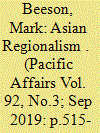

|
|
|
| 2 |
ID:
133292
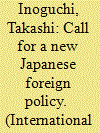

|
|
|
|
|
| Publication |
2014.
|
| Summary/Abstract |
Japanese foreign policy is at a crossroads. A global power transition is under way; while the United States remains the leading global power, across the globe non-western developing states are on the rise. Within Asia, China is a growing presence, wielding expansive claims on islands and maritime rights, and embarking on a defence buildup. As power shifts across Asia and the wider world, the terms of leadership and global governance have become more uncertain. Japan now finds itself asking basic questions about its own identity and strategic goals as a Great Power. Within this changing context, there are three foreign policy approaches available to Japan: (1) a classical realist line of working closely with the US in meeting China's rise and optimizing deep US engagement with China by pursuing a diplomacy focused on counterbalancing and hedging; (2) a transformative pragmatist line of rejuvenating itself through Abenomics and repositioning itself in East Asia; and (3) a liberal international line of pursuing a common agenda of enhancing global liberal-oriented norms and rules through multilateral institutions along with the United States and the Asia-Pacific countries. Current Japanese foreign policy contains a mix of all three approaches. The article argues that a greater focus on the second and the third lines would enhance the current approach; it would ensure that Japan is more in harmony with the global environment and help it work positively for global and regional stability and prosperity, thus enabling Japan to pursue an 'honorable place in the world' (as stated in the preamble to its constitution).
|
|
|
|
|
|
|
|
|
|
|
|
|
|
|
|
| 3 |
ID:
153009


|
|
|
|
|
| Summary/Abstract |
Traditionally seen as a President consumed by the war on terror, George W. Bush is frequently portrayed as being relatively uninterested in Asia, and unable to outline a vision or a strategy to China, America’s Asian allies and Asian multilateral mechanisms. This article will revisit Bush’s policy on Asia and show a president who guided the United States with a policy that balanced the need to combat global terrorism and locate a focus on Asia. He faced the dilemmas of building cooperative relations with a rising China while trying to foster American alliances and partnerships in Asia, and managing the wars in Afghanistan and Iraq. Utilizing qualitative content analysis as the main research method, the article will demonstrate that the Bush administration had not a lack of focus on Asia and that Bush’s diplomacy to Asia should be recognized as one of the most significant achievements of his presidency.
|
|
|
|
|
|
|
|
|
|
|
|
|
|
|
|
| 4 |
ID:
131007
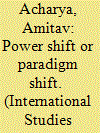

|
|
|
|
|
| Publication |
2014.
|
| Summary/Abstract |
This essay proposes a new theoretical framework for analyzing the rise of China and its impact on Asian security order. While the rise of China is reshaping Asia's military balance, the region has also witnessed equally important and longer-term changes, especially economic interdependence, multilateral institutions and domestic politics. The implications of these changes are not fully accounted for by the different types of security orders proposed by analysts to describe the implications of China's rise, such as anarchy, hierarchy, hegemony, concert, and community. This essay presents an alternative conceptualization of Asian security order, termed consociational security order (CSO) that draws from different theoretical lenses: defensive realism, institutionalism, and especially consociational theory in comparative politics. Specifying the conditions that make a CSO stable or unstable, the essay then examines the extent to which these conditions can be found in Asia today. Aside from offering a distinctive framework for analyzing China's rise, the CSO framework also offers an analytic device for policymakers and analysts in judging trends and directions in Asian security.
|
|
|
|
|
|
|
|
|
|
|
|
|
|
|
|
| 5 |
ID:
182520


|
|
|
|
|
| Summary/Abstract |
For some time now, there has been a push for the World Bank to shift its focus toward global public goods (GPGs). These are goods that, once delivered, can be unrestrictedly consumed by most—if not all—countries on the planet. Nor are their benefits rivalrous. Moreover, the production of GPGs cannot be left to markets or individual countries, as these have suboptimal incentives to act. In the wake of the COVID-19 outbreak, the concept of GPGs has seen a revival of sorts, with the pandemic not only striking just as multilateralism was at its lowest ebb, but also serving as irrefutable proof that the world needs international collaboration now more than ever. Multilateral institutions, and in particular the World Bank—a leading global institution with global membership—can rightfully be regarded as a possible solution to many global challenges. Based on interviews conducted with World Bank senior staff, as well as numerous experts, this article discusses arguments in favor of such a strategic shift. While there are legitimate claims for the Bank becoming a full-fledged provider of GPGs, the institution’s historical roots and operational constraints make this an unlikely prospect.
|
|
|
|
|
|
|
|
|
|
|
|
|
|
|
|
| 6 |
ID:
192515
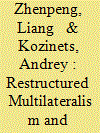

|
|
|
|
|
| Summary/Abstract |
Unlike the multilateral institutions of the past formed by hegemons in accordance with their interests, the multilateral format of the SCO (Shanghai Cooperation Organization) has given anew impetus to inclusive multilateral regional cooperation. In order to promote inclusive cooperation in Eurasia, the SCO member states have formulated strategic plans for cooperation in the main subregions and key areas of the organization's activities. New SCO plans to intensify cooperation consider the principle of inclusiveness and promote a system of compatibility of interests among members. Considering the relatively vague and "blurred" forms of cooperation existing among the member states, a quantitative increase in the SCO membership can both create new challenges and contribute to the emergence of new interaction formats. Thus, the introduction of new forms of "small multilateralism" may become relevant for enhancing the effectiveness of the SCO.
|
|
|
|
|
|
|
|
|
|
|
|
|
|
|
|
| 7 |
ID:
131997
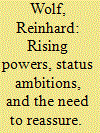

|
|
|
|
|
| Publication |
2014.
|
| Summary/Abstract |
This article focuses on the ominous parallels between the rise of Germany before World War I and China's ongoing ascendance. It will demonstrate that concerns about national status strongly affected both the fateful escalation of the 1914 crisis and the growing antagonisms of the years preceding. Special emphasis will be given to the role that mutual 'misrecognition' played in the gradual deterioration of Anglo-German relations. The consequences of Germany's excessive fixation on status are highly relevant for contemporary China, due to the startling similarities between both countries' domestic and international settings. If China wants to avoid the policy errors that led to the Kaiserreich's self-encirclement it needs to pay more attention to dangerous feedbacks among ongoing power shifts, maritime security dilemmas and extravagant public status concerns. China should do more to ensure that external trust in its benign intentions grows faster than its international ambitions and military power. This requires, among other things, an early settlement of ongoing territorial disputes, a toning down of jingoistic domestic discourses, enhanced leeway for speakers advocating international cooperation, and higher investment in multilateral institutions. Beijing's partners, for their part, must encourage such self-binding policies by facilitating China's rise in status, specifically by giving Beijing a greater say in these institutions
|
|
|
|
|
|
|
|
|
|
|
|
|
|
|
|
| 8 |
ID:
180872
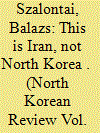

|
|
|
|
|
|
|
|